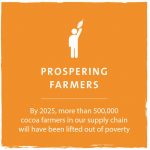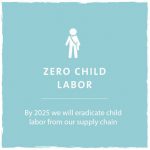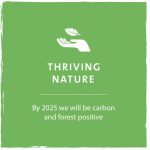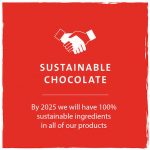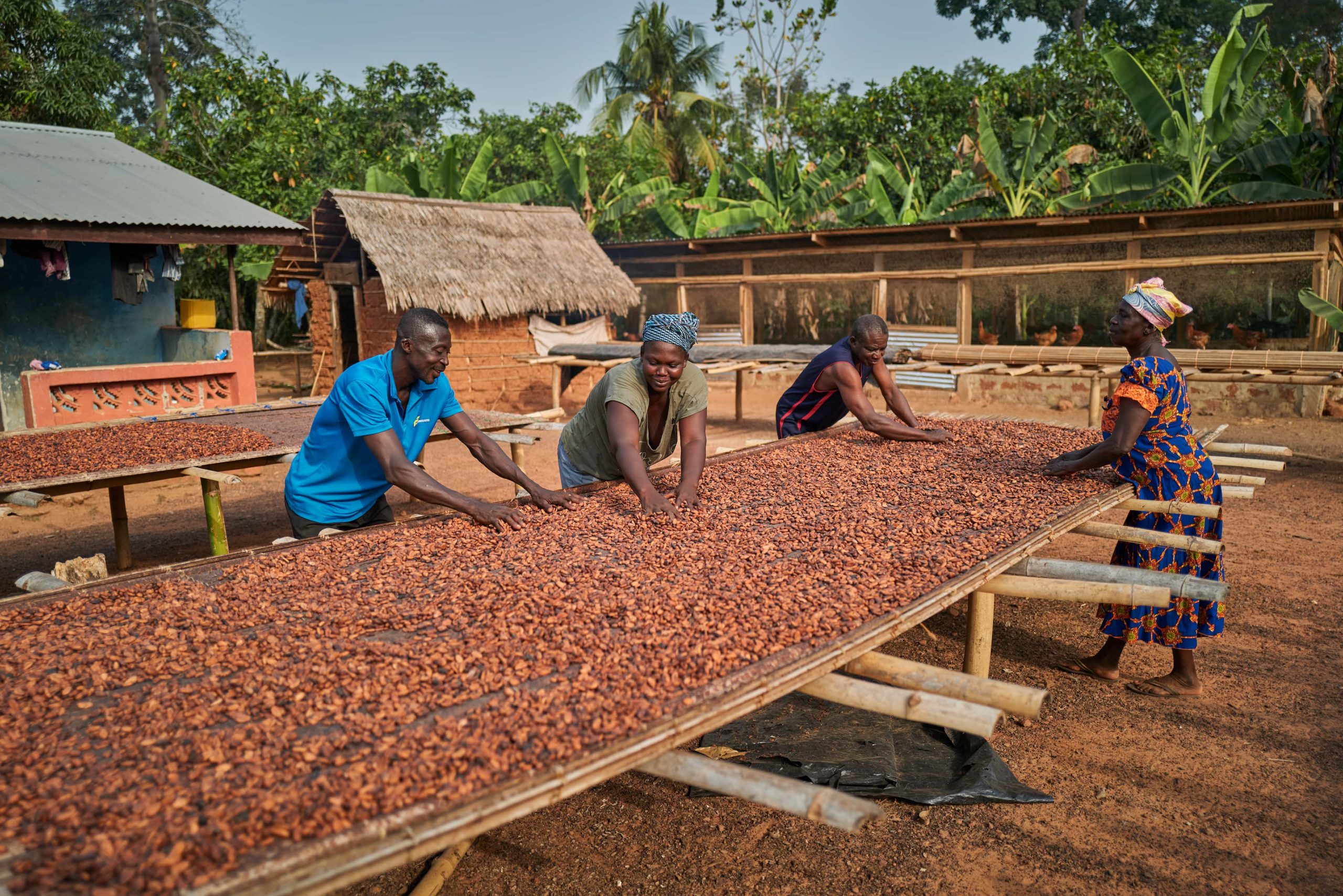
Barry Callebaut’s Forever Chocolate Progress Report 2020/21: carbon intensity reduction per tonne of product by 17% since 2016
(PRESS RELEASE) ZÜRICH, 3-Dec-2021 — /EuropaWire/ — Barry Callebaut Group (SWX: BARN), Switzerland-based cocoa processor and chocolate manufacturer, has announced the release of its Forever Chocolate Progress Report for 2020/21 measuring the company’s efforts towards making sustainable chocolate the norm by 2025. The key achievement in this year’s report is the reduction of the company’s carbon intensity per tonne of product by more than -17% since 2016.
The publication of our fifth Forever Chocolate Progress Report marks the half-way point of our plan to make Sustainable chocolate the norm by 2025. Our progress data in 2020/21 shows that we have continued to scale our efforts and create impact on our journey to make sustainable chocolate the norm by 2025.
- 214,584 cocoa farmers estimated to be out of poverty in our direct supply chain
- Our child labor monitoring and remediation system now covers 237 farmer groups, including 220,878 farmers in Côte d’Ivoire, Ghana and Cameroon
- Significant growth in Cocoa Horizons, with the premiums generating over CHF 28.4 million in funds, an increase of +63% compared to prior year
- Over -10% reduction of Land Use Change (LUC) from the impact of cocoa due to our efforts in traceability and sourcing
- 43% products sold containing 100% sustainable cocoa or chocolate
“This year, we celebrate the 5th anniversary of Forever Chocolate and I am extremely proud of the progress that we have made since 2016, creating tangible impact on the ground. Our outstanding achievements are only made possible with the expertise and dedication of our employees, partners and customers. I would like to warmly thank them for their commitment and invite other stakeholders to join us in this journey to make sustainable chocolate the norm by 2025,” commented Peter Boone, CEO of the Barry Callebaut Group.
Forever Chocolate is based on four ambitious targets:
“In 2020/21, we have continued to scale digital innovations, created a novel approach to measure carbon emissions, increased our individualized tailored support to cocoa farmers and developed a new approach to tackling child labor. Our application of leading innovative solutions is clearly paying off,” said Pablo Perversi, Chief Innovation, Sustainability & Quality Officer; Global Head of Gourmet.
Over 500,000 cocoa farmers out of poverty by 2025
In order to lift more than 500,000 cocoa farmers out of poverty in our supply chain, it is critical to have an in-depth understanding of the conditions, challenges and potential of the farms and farmers we are working with. Our unique and extensive farm mapping database was expanded to cover 234,997 farmers with full data in 2020/21. Over the past five years, we’ve learned that farm-specific support is more effective than a one-size-fits-all approach. In 2020/21 a total of 125,593 cocoa farmers in Côte d’Ivoire, Ghana, Cameroon, Brazil, Ecuador and Indonesia received Farm Services support.
For the measurement of progress against our target to lift over 500,000 cocoa farmers out of poverty by 2025, we are using as a starting point the International Poverty Line definition of extreme poverty of USD 1.90/day. But we are not stopping there. Our activities are directed to place farmers on a trajectory towards a living income and beyond, through increased productivity and income diversification. In 2020/21 we estimate 214,584 cocoa farmers (+50%) in our supply chain are out of poverty.
Eradicate child labor from our supply chain by 2025
Among the most prevalent types of child labor, occurring primarily on family farms, is that of children working at too young an age or working in hazardous conditions. In line with the United Nations Guiding Principles on Business and Human Rights, the solution lies not in ending the sourcing from these regions, but in assessing, monitoring and remediating on the ground the risk of children becoming involved in child labor. Therefore, we continue to monitor and identify cases of child labor rigorously and with intent. This year, our monitoring and remediation systems grew +116% to cover 237 farmer groups, including 220,878 farmers in Côte d’Ivoire, Ghana, and Cameroon. In addition, 25,486 (+412%) of the reported child labor cases we found in previous years, are now under remediation. The percentage of the farmer groups we directly source from with whom we undertake child labor monitoring and remediation activities is 61%.
Our approach to eradicate child labor is a child-centered approach which starts at the local level, engaging with children, parents, families and community members to create empowered communities to help their own development and make lasting change for the future. This approach relies on a framework of collaborative action from all stakeholders. In 2020, our partnership with Embode, the internationally renowned social protection and human rights consultancy, led to the finalization of our new approach to tackling child labor. This new approach sets clear internal milestones between 2020 and 2025 to guide planning, implementation, and stakeholder engagement.
Carbon and Forest positive by 2025
Since the commencement of Forever Chocolate in 2016, we were able to reduce our overall corporate carbon intensity per tonne of product by more than -17%. In addition, we also made outstanding progress in 2020/21 to reduce the carbon emissions caused by Land Use Change (LUC). Through the scaling of our traceability and sourcing efforts, we reduced the LUC impact from cocoa cultivation by over -10%.
A key component of evaluating our progress toward becoming forest positive is biodiversity, which includes both on-farm and off-farm efforts, such as soil regeneration and the creation of carbon sinks. By improving on-farm ecosystems, cocoa farmers can reduce the use of pesticides and fungicides. In addition, cocoa grown in the shade is linked to increased biodiversity, carbon sequestration, and nutrient retention in the soil. This year, we increased our planting capacity and are now planting over 35 trees per hectare, such as teak, mahogany and sejula, in Côte d’Ivoire and Ghana. This ramp up also aligns with the requirements of the Cocoa & Forests Initiative (CFI), of which we have been a founding signatory in 2017. Due to our tree planting activities, we account for a total of 240,000 tCO2e reduction this year alone, according to the Gold Standard Value Chain Intervention methodology.
Furthermore, we are actively participating in action-oriented business coalitions, such as World Business Council for Sustainable Development (WBCSD) and One Planet Business for Biodiversity (OP2B), to drive cross-commodity systemic change and restore natural biodiversity within value chains, in order to accelerate the transition towards sustainable business models.
100% sustainable ingredients by 2025
At Barry Callebaut, we are the key partner for our customers to enable them to fulfill their sustainability commitments. We work with, and implement, several sustainable cocoa programs to improve farmer livelihoods and farming practices. Among them is Cocoa Horizons, our preferred vehicle to drive impact and deliver on our Forever Chocolate ambition. In 2020/21, we have seen significant growth in Cocoa Horizons premiums, driven by strong demand from customers. The premiums from the purchase of HORIZONS cocoa products generated over CHF 28.4 million in funds, an increase of +61% compared to prior year. This uptake in demand is also reflected in the increase to 43% (+15%) of the percentage of cocoa and chocolate products sold that contain 100% sustainable cocoa or chocolate. In addition, in fiscal year 2020/21 we sourced 66% of all our non-cocoa ingredients from sustainable sources, an increase of +8% compared to the previous year.
We continued to lead the way in sustainable chocolate innovation this year. Almost two years after the development of WholeFruit chocolate, a chocolate containing only ingredients from the cacaofruit, in June 2021, Cacao Barry unleashed Cacao Barry’s WholeFruit Evocao™, the first signature expression of WholeFruit chocolate. WholeFruit Evocao™ was also the first global chocolate to qualify for the Upcycled Certified mark, developed by the Upcycled Food Association.
Media contact:
Taryn Ridley
Taryn Ridley
External Affairs Manager
+41 43 204 04 62
SOURCE: Barry Callebaut
- Digi Communications N.V. Announces Rating Assigned by Fitch Ratings to Digi Communications N.V.
- Digi Communications N.V. announces significant agreements concluded by the Company’s subsidiaries in Spain
- SGW Global Appoints Telcomdis as the Official European Distributor for Motorola Nursery and Motorola Sound Products
- Digi Communications N.V. announces the availability of the instruction regarding the payment of share dividend for the 2023 financial year
- Digi Communications N.V. announces the exercise of conditional share options by the executive directors of the Company, for the year 2023, as approved by the Company’s Ordinary General Shareholders’ Meetings from 18th May 2021 and 28th December 2022
- Digi Communications N.V. announces the granting of conditional stock options to Executive Directors of the Company based on the general shareholders’ meeting approval from 25 June 2024
- Digi Communications N.V. announces the OGMS resolutions and the availability of the approved 2023 Annual Report
- Czech Composer Tatiana Mikova Presents Her String Quartet ‘In Modo Lidico’ at Carnegie Hall
- SWIFTT: A Copernicus-based forest management tool to map, mitigate, and prevent the main threats to EU forests
- WickedBet Unveils Exciting Euro 2024 Promotion with Boosted Odds
- Museum of Unrest: a new space for activism, art and design
- Digi Communications N.V. announces the conclusion of a Senior Facility Agreement by companies within Digi Group
- Digi Communications N.V. announces the agreements concluded by Digi Romania (formerly named RCS & RDS S.A.), the Romanian subsidiary of the Company
- Green Light for Henri Hotel, Restaurants and Shops in the “Alter Fischereihafen” (Old Fishing Port) in Cuxhaven, opening Summer 2026
- Digi Communications N.V. reports consolidated revenues and other income of EUR 447 million, adjusted EBITDA (excluding IFRS 16) of EUR 140 million for Q1 2024
- Digi Communications announces the conclusion of Facilities Agreements by companies from Digi Group
- Digi Communications N.V. Announces the convocation of the Company’s general shareholders meeting for 25 June 2024 for the approval of, among others, the 2023 Annual Report
- Digi Communications NV announces Investors Call for the presentation of the Q1 2024 Financial Results
- Digi Communications intends to propose to shareholders the distribution of dividends for the fiscal year 2023 at the upcoming General Meeting of Shareholders, which shall take place in June 2024
- Digi Communications N.V. announces the availability of the Romanian version of the 2023 Annual Report
- Digi Communications N.V. announces the availability of the 2023 Annual Report
- International Airlines Group adopts Airline Economics by Skailark ↗️
- BevZero Spain Enhances Sustainability Efforts with Installation of Solar Panels at Production Facility
- Digi Communications N.V. announces share transaction made by an Executive Director of the Company with class B shares
- BevZero South Africa Achieves FSSC 22000 Food Safety Certification
- Digi Communications N.V.: Digi Spain Enters Agreement to Sell FTTH Network to International Investors for Up to EUR 750 Million
- Patients as Partners® Europe Announces the Launch of 8th Annual Meeting with 2024 Keynotes and Topics
- driveMybox continues its international expansion: Hungary as a new strategic location
- Monesave introduces Socialised budgeting: Meet the app quietly revolutionising how users budget
- Digi Communications NV announces the release of the 2023 Preliminary Financial Results
- Digi Communications NV announces Investors Call for the presentation of the 2023 Preliminary Financial Results
- Lensa, един от най-ценените търговци на оптика в Румъния, пристига в България. Първият шоурум е открит в София
- Criando o futuro: desenvolvimento da AENO no mercado de consumo em Portugal
- Digi Communications N.V. Announces the release of the Financial Calendar for 2024
- Customer Data Platform Industry Attracts New Participants: CDP Institute Report
- eCarsTrade annonce Dirk Van Roost au poste de Directeur Administratif et Financier: une décision stratégique pour la croissance à venir
- BevZero Announces Strategic Partnership with TOMSA Desil to Distribute equipment for sustainability in the wine industry, as well as the development of Next-Gen Dealcoholization technology
- Digi Communications N.V. announces share transaction made by a Non-Executive Director of the Company with class B shares
- Digi Spain Telecom, the subsidiary of Digi Communications NV in Spain, has concluded a spectrum transfer agreement for the purchase of spectrum licenses
- Эксперт по торговле акциями Сергей Левин запускает онлайн-мастер-класс по торговле сырьевыми товарами и хеджированию
- Digi Communications N.V. announces the conclusion by Company’s Portuguese subsidiary of a framework agreement for spectrum usage rights
- North Texas Couple Completes Dream Purchase of Ouray’s Iconic Beaumont Hotel
- Предприниматель и филантроп Михаил Пелег подчеркнул важность саммита ООН по Целям устойчивого развития 2023 года в Нью-Йорке
- Digi Communications NV announces the release of the Q3 2023 Financial Results
- IQ Biozoom Innovates Non-Invasive Self-Testing, Empowering People to Self-Monitor with Laboratory Precision at Home
- BevZero Introduces Energy Saving Tank Insulation System to Europe under name “BevClad”
- Motorvision Group reduces localization costs using AI dubbing thanks to partnering with Dubformer
- Digi Communications NV Announces Investors Call for the Q3 2023 Financial Results
- Jifiti Granted Electronic Money Institution (EMI) License in Europe
- Предприниматель Михаил Пелег выступил в защиту образования и грамотности на мероприятии ЮНЕСКО, посвящённом Международному дню грамотности
- VRG Components Welcomes New Austrian Independent Agent
- Digi Communications N.V. announces that Digi Spain Telecom S.L.U., its subsidiary in Spain, and abrdn plc have completed the first investment within the transaction having as subject matter the financing of the roll out of a Fibre-to-the-Home (“FTTH”) network in Andalusia, Spain
- Продюсер Михаил Пелег, как сообщается, работает над новым сериалом с участием крупной голливудской актрисы
- Double digit growth in global hospitality industry for Q4 2023
- ITC Deploys Traffic Management Solution in Peachtree Corners, Launches into United States Market
- Cyviz onthult nieuwe TEMPEST dynamische controlekamer in Benelux, Nederland
- EU-Funded CommuniCity Launches its Second Open Call
- Astrologia pode dar pistas sobre a separação de Sophie Turner e Joe Jonas
- La astrología puede señalar las razones de la separación de Sophie Turner y Joe Jonas
- Empowering Europe against infectious diseases: innovative framework to tackle climate-driven health risks
- Montachem International Enters Compostable Materials Market with Seaweed Resins Company Loliware
- Digi Communications N.V. announces that its Belgian affiliated companies are moving ahead with their operations
- Digi Communications N.V. announces the exercise of conditional share options by an executive director of the Company, for the year 2022, as approved by the Company’s Ordinary General Shareholders’ Meeting from 18 May 2021
- Digi Communications N.V. announces the availability of the instruction regarding the payment of share dividend for the 2022 financial year
- Digi Communications N.V. announces the availability of the 2022 Annual Report
- Digi Communications N.V. announces the general shareholders’ meeting resolutions from 18 August 2023 approving amongst others, the 2022 Annual Accounts
- Русские эмигранты усиливают призывы «Я хочу, чтобы вы жили» через искусство
- BevZero Introduces State-of-the-Art Mobile Flash Pasteurization Unit to Enhance Non-Alcoholic Beverage Stability at South Africa Facility
- Russian Emigrés Amplify Pleas of “I Want You to Live” through Art
- Digi Communications NV announces the release of H1 2023 Financial Results
- Digi Communications NV Announces Investors Call for the H1 2023 Financial Results
- Digi Communications N.V. announces the convocation of the Company’s general shareholders meeting for 18 August 2023 for the approval of, among others, the 2022 Annual Report
- “Art Is Our Weapon”: Artists in Exile Deploy Their Talents in Support of Peace, Justice for Ukraine
- Digi Communications N.V. announces the availability of the 2022 Annual Financial Report
- “AmsEindShuttle” nuevo servicio de transporte que conecta el aeropuerto de Eindhoven y Ámsterdam
- Un nuovo servizio navetta “AmsEindShuttle” collega l’aeroporto di Eindhoven ad Amsterdam
- Digi Communications N.V. announces the conclusion of an amendment agreement to the Facility Agreement dated 26 July 2021, by the Company’s Spanish subsidiary
- Digi Communications N.V. announces an amendment of the Company’s 2023 financial calendar
- iGulu F1: Brewing Evolution Unleashed
- Почему интерактивная «Карта мира» собрала ключевые антивоенные сообщества россиян по всему миру и становится для них важнейшим инструментом
- Hajj Minister meets EU ambassadors to Saudi Arabia
- Online Organizing Platform “Map of Peace” Emerges as Key Tool for Diaspora Activists
- Digi Communications N.V. announces that conditional stock options were granted to executive directors of the Company based on the general shareholders’ meeting approval from 18 May 2021
- Digi Communications N.V. announces the release of the Q1 2023 financial results
- AMBROSIA – A MULTIPLEXED PLASMO-PHOTONIC BIOSENSING PLATFORM FOR RAPID AND INTELLIGENT SEPSIS DIAGNOSIS AT THE POINT-OF-CARE
- Digi Communications NV announces Investors Call for the Q1 2023 Financial Results presentation
- Digi Communications N.V. announces the amendment of the Company’s 2023 financial calendar
- Digi Communications N.V. announces the conclusion of two Facilities Agreements by the Company’s Romanian subsidiary
- Digi Communications N.V. announces the conclusion of a Senior Facility Agreement by the Company’s Romanian subsidiary
- Patients as Partners Europe Returns to London and Announces Agenda Highlights
- GRETE PROJECT RESULTS PRESENTED TO TEXTILE INDUSTRY STAKEHOLDERS AT INTERNATIONAL CELLULOSE FIBRES CONFERENCE
- Digi Communications N.V. announces Digi Spain Telecom S.L.U., its subsidiary in Spain, entered into an investment agreement with abrdn to finance the roll out of a Fibre-to-the-Home (FTTH) network in Andalusia, Spain
- XSpline SPA / University of Linz (Austria): the first patient has been enrolled in the international multicenter clinical study for the Cardiac Resynchronization Therapy DeliveRy guided by non-Invasive electrical and VEnous anatomy assessment (CRT-DRIVE)
- Franklin Junction Expands Host Kitchen® Network To Europe with Digital Food Hall Pioneer Casper
- Unihertz a dévoilé un nouveau smartphone distinctif, Luna, au MWC 2023 de Barcelone
- Unihertz Brachte ein Neues, Markantes Smartphone, Luna, auf dem MWC 2023 in Barcelona
- Editor's pick archive....

